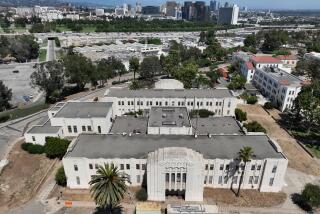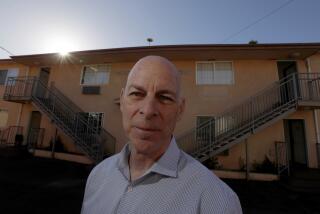Steven J. Murphy, once a homeless Vietnam vet and now a millionaire, has not forgotten his past. He has bought a home and apartments for recovering veterans. Now they have . . . : A Place of Their Own
Stephen J. Murphy knows what itâs like to be down on your luck. Less than a decade ago, he was an alcoholic and living in a soon-to-be-repossessed Corvette.
But Murphyâs luck has turned around.
In six years, Murphy has amassed a fortune by buying foreclosed properties at bargain basement prices. In an ironic twist, he made millions from the misfortune or bad business sense of others.
âI have slept behind garbage cans. I have slept in parks. I have slept in abandoned construction sites,â Murphy said recently as he sat in his comfortable penthouse offices in Marina del Rey, complete with an expansive ocean view.
The 44-year-old president of American Capital Investments Inc. has not forgotten his past and is not content with just changing his own life.
Last year, Murphy launched the American Capital Foundation for the Homeless, which purchases foreclosed residential properties and transforms them into group treatment homes for veterans trying to kick alcohol or drugs.
Earlier this week, three veterans moved into Murphyâs latest acquisition, a three-story, $1.1-million apartment building on Wade Street in Mar Vista, a home that eventually will house 45 to 50 veterans. It is the third such project that Murphy has undertaken.
Murphyâs foundation is affiliated with New Directions, a nonprofit group that operates the rehabilitation programs in Murphyâs buildings.
New Directions began in 1977 as a residential treatment program at the Veterans Administration Hospital in Westwood. In 1989, the VA, facing budget cuts, withdrew funding for the program. John Keaveney, a New Directions graduate who returned from the Vietnam War a heroin addict, turned the program into an independent organization with former residents Alvin Jones and Larry Williams.
Murphy began his affiliation with New Directions in September, 1992, when, according to Keaveney, he saved the day for nine veterans. The vets were about to be evicted from New Directions home because the previous owner was into foreclosure. Murphy stepped in, buying the 3,000-square-foot, four-bedroom home on South Barrington Avenue in Mar Vista for $390,000.
Although the house is in Murphyâs name, New Directions has full use of it. And within five years, Murphy said, he will turn over the deed to the house to New Directions, which is funded by donations from private firms and local veterans groups.
In addition to the two houses in Los Angeles, Murphyâs foundation owns a third in New Haven, Conn.
âIâm in the business of saving lives,â Murphy said. âI want the guys . . . to become self-sufficient--to take pride in what they do.â
Toward that aim, Murphy plans to buy a carwash soon where the veterans can work.
When that happens, the vets will be expected to pay rent instead of living rent-free as they do now. In addition, Murphy recently provided a $10,000 for no-interest educational loans so that the tenants can learn new skills.
Being in the real estate business, Murphy is keenly aware of the importance of getting good tenants, and the veterans have not let him down. âYou couldnât ask for better,â Murphy said.
The veterans take special pains to make their home a pleasant refuge, as witnessed by the well-polished hardwood floors and well-kept rooms. The residents maintain a garden, in which they grow cantaloupes, cabbage, corn, watermelon and green beans.
Those in the rehab program, which includes group therapy and assertiveness training, are urged to reach out to those less fortunate.
âItâs our way of giving back,â says Bruce Melson, 42, New Directionsâ administrative coordinator, adding that veterans feed the homeless, give talks to children about the Vietnam War experience and work with gang members.
Veterans are referred to New Directions by the Veterans Administration Hospital, Clare Foundation and other agencies. Applicants are screened by current residents, who decide if a veteran can enter the program.
âThe criterion is how willing they are to change from the old mode of behaviors which kept them homeless to a type of understanding of how to accept life on its own terms,â Melson said.
Murphy understands how important that is.
âI was very self-destructive. I was more interested in pursuing alcoholism than anything else,â Murphy said of those low days in 1985 and 1986 when he was âdodging the repo manâ and working odd jobs to feed himself and pay for alcohol.
As with many Vietnam vets, Murphy thinks the horror of participating in front-line action took its toll on him. He spent 11 months in the 1st Infantry Division (the âBig Red Oneâ) that he says triggered trauma and stress. Discharged in 1970, Murphy stayed in Saigon, working for the U.S. Army procurement office.
Upon returning home, Murphy obtained a political science degree from UCLA, worked as a stockbroker and as a publisher of international banking and trade books, all despite a mounting drinking problem. But eventually alcoholism led Murphy to destitution.
In 1987, Murphy, with the help of Alcoholics Anonymous, managed to give up drinking and took menial, part-time jobs to get enough money to get off the streets.
With that accomplished, Murphy renewed his license and became a securities broker in 1990. Taking his savings, he founded American Capital Investments, with the backing of several investors.
ACI buys foreclosed commercial office buildings. ACI then leases the buildings and sells equity interest in some of the properties to individual investors, paying a set rate of return, depending on the property.
Murphyâs office includes ample testimony to his financial success. Lining two walls are photographs of American Capital Investmentsâ commercial properties, which now number 32.
Murphyâs work space also includes a number of expensive collectibles, which he delights in showing to visitors. For instance, he has a shiny, 1948 Pepsi-Cola machine now worth $4,800. He reports that he paid only $1,800. He also has a 1935 slot machine.
Then there is a letter from Mother Teresa. And a resolution from the City of Los Angeles commending Murphy for his generosity in helping others turn their lives around.
His story has drawn the attention of several screenwriters and producers, who he says have expressed interest in doing a film about his life and a TV series.
The real estate baron also is making a name for himself as an author.
His latest book is âFormerly One Up On Trump: âHow You Too Can Make $$$ Millions in Uncle Samâs $400-Billion Real Estate Fire Sale!â The self-published book has sold nearly 25,000 copies.
âTrickle Up Economicsâ was released this month as well. In early May, he plans to release âReal Estate Wheel of Fortune.â Then thereâs âBeating the Dealâ--about âhow to get a really, really good real estate dealâ--which will be published in mid-May, Murphy said. And he is penning his autobiography with another writer.
The proceeds from all of his books go to his American Capital Foundation for the Homeless.
Even though Murphy has completed the journey from rags to riches, Murphy said he still feels a kinship with the men living under his roofs. Indeed, the war experience, combined with substance-abuse problems, makes for some strong bonds between the men.
âTheyâre like me,â Murphy says of his current and former tenants. Apparently they feel the same affinity.
âStephenâs somebody very successful who didnât forget where he came from,â says Decker Sims, 32, noting that Murphy calls the homes âall the timeâ and drops by two to three times a month. Sims, who is studying to be a stockbroker, is one of those who âgraduatedâ from phase one of the New Directions program, moving out of the Mar Vista house and into the nearby apartment house, which is for veterans who are further along in their re-entry into society.
âStephenâs one of the guys. He is setting an example,â added James Andrew, 39, a former resident who is now working at the Avalon Carver Community Center. ââHeâs like a fairy godmother-type that waved her wand.â
More to Read
Sign up for Essential California
The most important California stories and recommendations in your inbox every morning.
You may occasionally receive promotional content from the Los Angeles Times.






